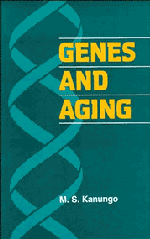Crossref Citations
This Book has been
cited by the following publications. This list is generated based on data provided by Crossref.
Mishra, R. N.
and
Kanungo, M. S.
1994.
Alterations in histones of the liver and oviduct of Japanese quail during aging.
Molecular Biology Reports,
Vol. 20,
Issue. 1,
p.
15.
Subbarayan, P. R.
Sarkar, Malancha
and
Vinayak, Manjula
1995.
Analysis of transfer RNA during the early embryogenesis of the freshwater teleost,Heteropneustes fossilis.
Molecular Biology Reports,
Vol. 21,
Issue. 2,
p.
113.
Chaurasia, Pratima
and
Thakur, M.K
1997.
Nucleosomal organization of the rat liver satellite DNA-containing chromatin during aging.
Mechanisms of Ageing and Development,
Vol. 95,
Issue. 1-2,
p.
63.
Rao, Kalluri Subba
Annapurna, V. V.
and
Raji, N. S.
2001.
DNA Polymerase‐β May Be the Main Player for Defective DNA Repair in Aging Rat Neurons.
Annals of the New York Academy of Sciences,
Vol. 928,
Issue. 1,
p.
113.
Ballas, Christopher B.
and
Davidson, Jeffrey M.
2001.
Delayed wound healing in aged rats is associated with increased collagen gel remodeling and contraction by skin fibroblasts, not with differences in apoptotic or myofibroblast cell populations.
Wound Repair and Regeneration,
Vol. 9,
Issue. 3,
p.
223.
Tzafestas, Elpida S.
2001.
Aging agents.
Artificial Life and Robotics,
Vol. 5,
Issue. 1,
p.
46.
Ramamurti, P. V.
2003.
Perspectives of Research on Aging in India.
Journal of Aging & Social Policy,
Vol. 15,
Issue. 2-3,
p.
31.
Thakur, M. K.
2003.
Modulating Aging and Longevity.
p.
219.
Behl, Christian
2004.
Molekularmedizinische Grundlagen von altersspezifischen Erkrankungen.
p.
67.
Rattan, Suresh I.S.
2006.
Prevention and Treatment of Age-related Diseases.
p.
1.
SHARMA, RAMESH
and
DUTTA, DEBIPREETA
2006.
Age‐Dependent Decrease in Renal Glucocorticoid Receptor Function Is Reversed by Dietary Restriction in Mice.
Annals of the New York Academy of Sciences,
Vol. 1067,
Issue. 1,
p.
129.
Ranhotra, Harmit S.
and
Sharma, R.
2010.
Moderately high altitude habitation modulates lipid profile and alkaline phosphatase activity in aged Khasis of Meghalaya.
Indian Journal of Clinical Biochemistry,
Vol. 25,
Issue. 1,
p.
51.
Modi, Pankaj
2011.
Nutrients, Dietary Supplements, and Nutriceuticals.
p.
227.
Vijg, Jan
and
Suh, Yousin
2013.
Genome Instability and Aging.
Annual Review of Physiology,
Vol. 75,
Issue. 1,
p.
645.
Kanungo, M. S.
2017.
Molecular Basis of Aging.
p.
183.
Rath, Pramod C.
2017.
Hormones in Ageing and Longevity.
Vol. 6,
Issue. ,
p.
291.
Motta-Neto, Clóvis C.
Marques, André
Costa, Gideão W.W.F.
Cioffi, Marcelo B.
Bertollo, Luiz A.C.
Soares, Rodrigo X.
Scortecci, Kátia C.
Artoni, Roberto F.
and
Molina, Wagner F.
2018.
Differential hypomethylation of the repetitive Tol2/Alu-rich sequences in the genome of Bodianus species (Labriformes, Labridae).
Comparative Cytogenetics,
Vol. 12,
Issue. 2,
p.
145.
Lee, Hye-Yeon
Lee, Bora
Lee, Eun-Ji
and
Min, Kyung-Jin
2023.
Effects of Parental Dietary Restriction on Offspring Fitness in Drosophila melanogaster.
Nutrients,
Vol. 15,
Issue. 5,
p.
1273.





